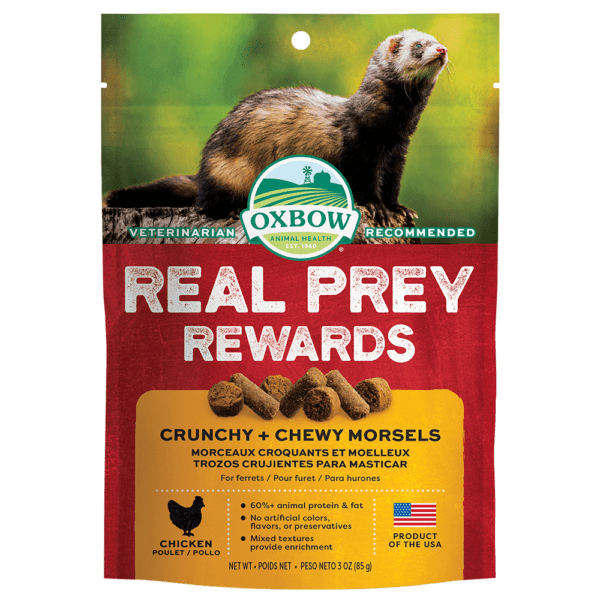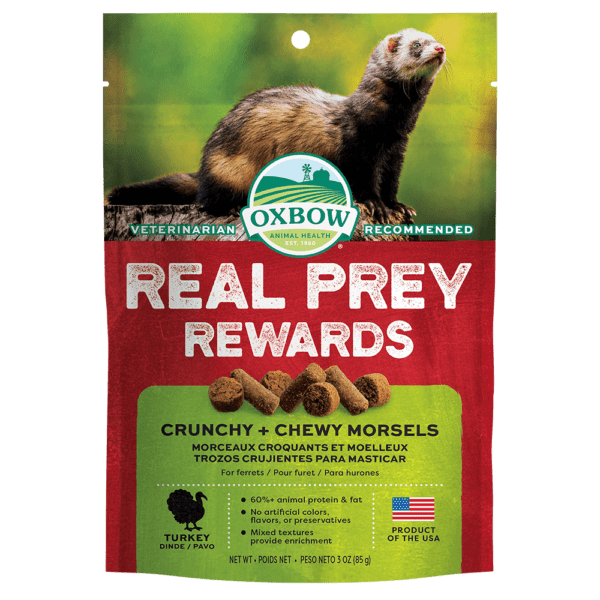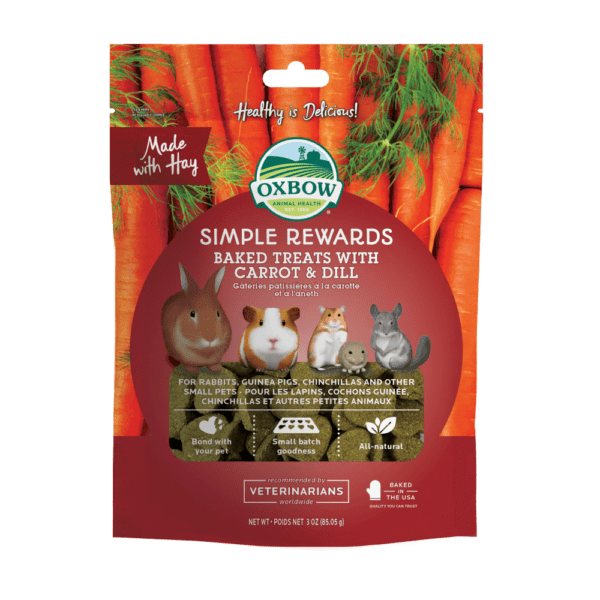Updated May 27, 2025
Sharing your home with a bunny, guinea pig, or ferret brings daily joy. They’re sweet, curious, and endlessly entertaining companions that make every day more delightful.
Treats are a great way to bond with your pet! Whether you’re rewarding your rabbit for hopping into your lap or training your guinea pig to spin in circles. But not all treats are the same. And picking the wrong ones can lead to digestive issues and other health problems.
So how do you select treats for your small mammal that are both delicious and healthy? Let’s dig into the best healthy treats for rabbits, guinea pigs and ferrets!
What to Look for When Choosing Treats
#1: Herbivores vs. Carnivores
Choosing the right treat starts with understanding your pet’s nutritional needs. Your small animal falls into two categories: herbivores and carnivores. This will drive which treats to select and help them live their happiest, healthiest lives.
Quick Nutritional Guide:
Choosing the right treat starts with understanding your pet’s nutritional needs. Your small animal falls into two categories: herbivores and carnivores. This will drive which treats to select and help them live their happiest, healthiest lives.
Guinea Pigs
Herbivore | Hindgut fermenter
Key Needs:
- Timothy hay or other grass hay should make up the bulk of their diet.
- Daily vitamin C is critical—they can’t produce it on their own.
- Fresh leafy greens (e.g. romaine, parsley, cilantro).
- Limited fruits and vegetables as occasional treats.
- High-fiber pellets fortified with vitamin C (no seeds or colorful bits).
Avoid:
- High-sugar foods
- Foods rich in calcium (e.g. kale, spinach) in large quantities, can cause bladder stones
- Animal-based proteins (they’re strict herbivores)
Rabbits
Herbivore | Hindgut fermenter
Key Needs:
- Unlimited grass hay (timothy, orchard, oat hay).
- Fresh leafy greens daily.
- Small amounts of high-fiber pellets.
- Occasional fruits and veggies as treats, served in small pieces.
Special Consideration:
- Their digestive tract is delicate; sudden changes or low-fiber diets can lead to GI stasis, a life-threatening condition.
Avoid:
- High-sugar, high-fat treats
- Foods high in calcium without balance (e.g. too much kale or parsley)
Ferrets
Obligate carnivore | Short GI tract
Key Needs:
- High-protein, high-fat diet from animal sources (meat-based).
- Raw or freeze-dried meat treats are ideal.
- Premium ferret kibble or raw feeding plans approved by a vet.
What They Should NOT Eat:
- Fruits and vegetables (can cause digestive issues or insulinoma from high sugar content)
- Dairy (causes diarrhea)
- Carbs or fiber-heavy foods (they can’t digest fiber)
Treats for Herbivores and Carnivores:
Now let’s dive into species-specific nutrients to look for
while shopping for or sourcing treats.
Fiber (Herbivores Only)
Fiber is the cornerstone of a healthy digestive system for herbivorous small mammals, especially rabbits and guinea pigs. These animals are natural foragers that depend on high-fiber diets like grasses and hay to keep their guts moving and their teeth trimmed.
Treats should contain both soluble fiber (helps regulate blood sugar and gut bacteria) and insoluble fiber (adds bulk and supports motility). A lack of fiber can lead to life-threatening digestive upsets.
Vitamins (Herbivores Only)
When selecting healthy treats for rabbits and guinea pigs, check for essential vitamins. For example, vitamin C is critical for guinea pigs who can’t produce it on their own. And vitamin A, which helps with vision and immunity.
Baby rabbits and guinea pigs benefit from vitamin-rich diets to support growth, while adults need them to stay energized and healthy. Look for treats that are high in vitamin content but low in sugar.
Minerals (Herbivores Only)
Small pets need minerals like calcium, phosphorus, and magnesium to support their bones, teeth, and organ function. But balance is key! Too much calcium can lead to bladder stones in rabbits and guinea pigs, while too little can cause weakness. Always consult your vet about your pet’s mineral needs.
Ferrets, on the other hand, do not require plant-based minerals in treats and should receive their nutrition from meat-based foods.
Protein and Fat (Carnivores Only)
Ferrets rely on high-quality animal protein and fat to fuel their active metabolisms. Unlike herbivores, they have a short digestive tract and no cecum. Meaning they can’t process fiber or plant-based nutrients effectively.
Treats for ferrets should be rich in protein from chicken, turkey, or liver, and should avoid plant fillers. Look for freeze-dried meat treats or vet-approved carnivore snack options that mimic their natural prey-based diet.
What to Avoid When Choosing Treats
Tempting as they may be, not all treats belong in your pet’s food bowl. Some common human ingredients can be harmful or even deadly to small exotic mammals. Avoid treats that contain:
- Sugar
- Artificial Colors
- Fruit Stones, Seeds, and Pips
- Dairy Products
Sugar
Treats high in sugar may seem like a fun indulgence, but they can wreak havoc on your small pet’s body. Sugar contributes to:
- Dental decay in rabbits and guinea pigs, whose teeth grow forever
- Obesity, which can worsen arthritis and limit mobility
- Digestive upset, including diarrhea and painful gas, especially in species with sensitive guts like chinchillas and rats
Artificial Colors
Colorful treats may be fun, but artificial dyes have been linked to hyperactivity, allergies and long-term health issues. Small animals have tiny livers that cannot sustain large amounts of unnecessary additives. Stick with treats made from more natural ingredients.
Fruit Stones, Seeds, and Pips
While some fruits are okay, the stones, seeds, and pips inside them often contain cyanogenic compounds, which are toxic to pets. Apple seeds, for example, contain trace amounts of cyanide. Always remove seeds before offering fruits like apples, watermelon, and grapes.
Dairy Products
Many small exotic mammals are lactose intolerant. Ferrets, in particular, can experience severe diarrhea from dairy. Rabbits and guinea pigs may suffer from bloating and gut imbalance. Even if your pet seems to enjoy cheese or yogurt, it’s best to avoid dairy-based treats entirely.
Small Animals and Fruit FAQs: (Herbivores Only)
Introducing new foods to your furry friend can be fun, but it’s important to make safe, informed choices. Here’s a look at some of the most frequently asked questions about fruits and small animals:
- Can rabbits eat watermelon? Yes! Rabbits can enjoy a small piece of seedless watermelon as an occasional treat. Hydrating and refreshing, but has a ton of sugar. Meaning you should only serve once or twice a week.
- Can rabbits have apples? Absolutely—but only in moderation and with the seeds removed. Apples are high in sugar, so feed just a small slice as an occasional treat.
- Can guinea pigs eat apples? Yes, guinea pigs can eat apple slices without seeds. They enjoy the sweetness, but like rabbits, too much can cause digestive issues.
- Can guinea pigs eat bananas? Yes, but only a tiny slice at a time. Bananas are high in sugar and can lead to digestive upsets if overfed.
- Can rabbits eat grapes? Grapes might be okay for rabbits in small amounts, but they’re high in sugar and should only be an occasional treat.
- Can rabbits eat strawberries? Yes! Strawberries are a bunny favorite. Offer a small piece once or twice a week.
- Can guinea pigs eat tomatoes? Maybe, but offer only the fleshy part—no leaves or stems. Tomatoes are acidic, so serve in small portions to avoid tummy troubles.
- Can guinea pigs eat celery? Yes, chopped celery is a good hydrating snack. Just avoid long, stringy pieces to reduce the risk of choking.
- Can rabbits eat cucumbers? Yes, cucumbers are low in calories and make a good hydrating treat in the summer.
Healthy Treats for Small Animals
Healthy treats don’t just make pets happy. They can supplement their diet and add variety to their day. Whether you’re tossing a blueberry to your bunny or giving a slice of cucumber to your guinea pig, always serve treats in moderation.
These are the four main categories of healthy treats:
- Fruits (Herbivores only)
- Vegetables (Herbivores only)
- Leafy Greens (Herbivores only)
- Packaged Treats (Herbivores and Carnivores)
Fruits
Fruits are sweet, juicy, and loved by herbivores. But they’re naturally high in sugar, so serve them sparingly. Best Fruits for Rabbits, Guinea Pigs and other Herbivores:
- Apples (no seeds) – Can rabbits eat apples? Yes without seeds. This fruit is actually a favorite among rabbits, guinea pigs, and hamsters.
- Strawberries – Great for guinea pigs and rabbits in small amounts.
- Watermelon (seedless) – Hydrating and refreshing.
- Grapes (cut in half) – Enjoyed by many, but high in sugar.
- Bananas – High in potassium, but best kept as a once-a-week snack.
Feed fruit just 1–2 times a week in small quantities—think thumb-sized portions. A rabbit’s diet or guinea pig’s diet should never be fruit-heavy.
Vegetables
Crunchy and satisfying, veggies offer fiber, hydration, and nutrients. Great Veggies to Offer:
- Carrots – Enjoyed by rabbits and guinea pigs alike.
- Celery (chopped) – Can rabbits eat celery? Sure, it helps hydrate but should be finely chopped.
- Cucumbers – Low-calorie and hydrating.
- Broccoli – Nutrient-dense, but can cause gas—serve sparingly.
- Tomatoes (no leaves/stems) – Can rabbits eat tomatoes? Yes.
Serve vegetables a few times per week—about a tablespoon per 2 lbs of body weight.
Leafy Greens
Leafy greens are some of the best healthy treats for rabbits and guinea pigs because of their high fiber content and low sugar levels. So if you’re wondering “what do I feed a bunny,” leafy greens in small amounts are a great option. Top Picks:
- Romaine lettuce (not iceberg!)
- Dandelion greens
- Parsley
- Cilantro
- Kale (high calcium, so feed in moderation)
Chinchillas and gerbils may need smaller portions. Rabbits can eat greens daily, while guinea pigs need a mix of leafy greens and vitamin C–rich foods. Feeding your guinea pigs a variety of greens helps prevent deficiencies and keeps their digestive system healthy.
Packaged Snacks
For pet parents short on time, high-quality packaged treats can be a game-changer. Brands like Oxbow’s Simple Rewards offer options that are specifically formulated for small animals.
Herbivores:
- Simple Rewards Strawberry Treats – perfect for rabbits, guinea pigs, chinchillas and other herbivores.
- Simple Rewards Timothy Treats – ideal for hay-loving pets like rabbits and guinea pigs.
- Simple Rewards Veggie Treats – a crunchy favorite for gerbils and rats.
- Simple Rewards Apple and Banana – fruity favorite for herbivores.
- Real Prey Rewards (Chicken) – real chicken flavor your ferret will love!
- Real Prey Rewards (Turkey) – formulated with the high-quality protein and fat sources your carnivore needs.
*Tip: Treats should make up no more than 2% of your pet’s daily diet. That means only 1–2 treats per day, depending on your animal’s size and species. And remember—timothy hay and other grasses should always be the foundation of your pet’s daily intake.
How To Avoid Overfeeding Your Small Exotic Pet
It’s easy to go overboard when your bunny gives you that adorable head tilt, but too many treats can cause weight gain, digestive issues, and even shorten your pet’s lifespan. Pro Tips for Treat Control:
- Break larger treats into smaller pieces during training.
- Use a dry erase board or notebook to track daily treats (especially if multiple people are involved in care).
- Prioritize fresh hay and species-appropriate food as the foundation of your pet’s nutrition.
Treat Time = Play Time
Treats aren’t just for nutrition. They’re also great for enrichment and bonding with your pet. Adding treats to your pet’s playtime stimulates both their body and brain.
Fun Ways to Serve Treats:
- Hide small treats in your rabbit’s hay pile for foraging fun.
- Use a snuffle mat or dig box for your guinea pig to explore.
- Create a mini obstacle course for your ferret, with treats as rewards.
- Freeze fruit bits inside ice cubes for hot summer days.
These activities help mimic natural behaviors and keep pets mentally stimulated and happy.
at’s why our Simple Rewards Treats are made with natural ingredients such as cranberries, bananas, apples, carrots, strawberries, barley and other delicious flavors pets love!
Additional Nutrition and Enrichment Care Tips & Tricks
How can I provide my pet with nutritional enrichment?
What kinds of games can I play with my rabbit, guinea pig, chinchilla or other small pet?




